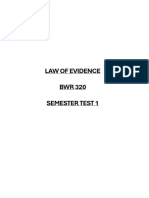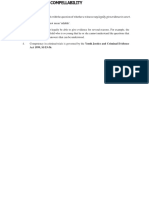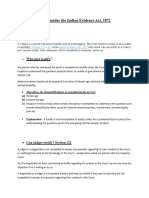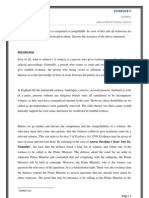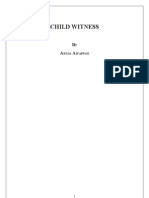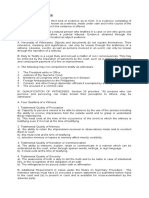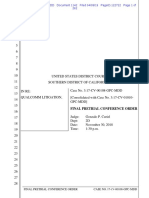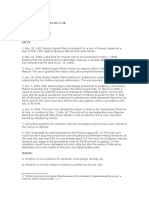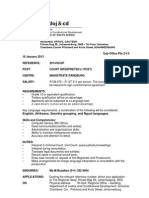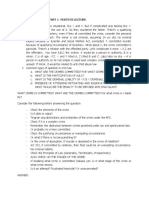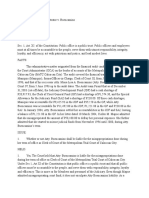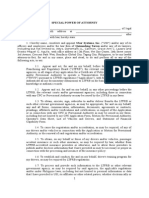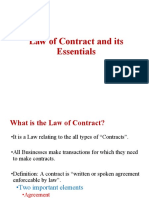THE COMPETENCE AND COMPELLABILTY OF WITNESSES
▪ s4 & s5 of Civil Evidence Act
▪ s244, s245, s246, s292 of CPEA, as subsequently amended.
Competence and compellability are two distinct terms
‘Competence’ may be referred to as the ability to give evidence at trial.
✓ Any witness called to testify must have ‘competence’ to testify.
✓ This means that such witnesses are legally permitted to give evidence.
❖ The three basic requirements for a person to qualify as a ‘competent witness’
are:
(i) capacity to observe,
(ii) remember and narrate, and
(iii) understanding of the duty to tell the truth.
✓ Examples of being capable to observe is having senses such as
sight, hearing, touch and smell.
✓ Remembering and narrating can be described as being able to
speak and communicate to other while duty to tell the truth is just
understanding the difference between right and wrong.
❖ The special qualifications for child witnesses are:
(i) the understanding to speak the truth,
(ii) mental capacity at time of crime and
(iii) be able to give accurate impression of it.
❖ How is competence assessed?
o Where a question over the competence of a witness is raised by
either the defence, the prosecution or the court itself, the party
calling the witness will need to satisfy the Court that the witness is
competent to give evidence.
o The court will take into account any ‘special measures’ that can be
provided to the witness, such as intermediaries and aids to
communication. Where necessary the court can take into account
1
� expert evidence about the witness and the witness can be
questioned before the trial to determine competence.
o Also, young witnesses can be considered competent to give evidence at
trial, but much can depend on the complexity of the evidence required and
the individual characteristics of the witness.
o For this reason, every case and every witness is different, and the final
decision rests with the court.
o A witness’s understanding is most relevant to young children and people
with mental disorders.
o If a child can remember the event, recall it and answer question about it ,
then such a child can be a competent witness.
▪ Competence and capacity are distinct issues.
o For example, the Mental Health Act is concerned with a person’s capacity
to make decisions rather than to give evidence.
o Capacity is only relevant to competence in terms of assessing the
witness' ability to understand questions and provide replies that can be
understood.
o A witness may be prevented by incapacity, such as mental disorder or the
effect of alcohol or medication, from being competent but that lack of
competence is only co-extensive with the incapacity.
o Thus, a person who is drunk will be competent once sober. Where
incapacity is only temporary, the Court have the discretion to postpone
the proceedings until that incapacity has ended.
o A person who has a mental illness may still be a competent witness if that
illness only affects an aspect of the person’s character which does not
diminish his or her capacity to recall information on matters relevant to the
proceedings or to appreciate the nature of the oath.
o Correspondingly, the clarity of their evidence may be affected by factors
such as distress, anxiety or panic which are not relevant to the question
of capacity.
2
� ‘Compellability’ may be referred to as the extent to which a witness can be
forced to give evidence at trial, even if the witness may not wish to do so .
Compellability is about whether, as a matter of law, a witness can be required to
give evidence when they do not wish to do so. Cf eg s291 & s292 of CPEA.
▪ Generally, in civil proceedings all witnesses that are competent to give
evidence may also be compelled to do so. In particular, s6 Civil Evidence
Act makes the spouse of a party to the proceedings both competent and
compellable
o Thus, the compellability of a witness may refer to the power to force a
competent witness to testify even if it's against their will
❖ How can a witness be compelled to give evidence?
o a witness is compellable if he can be forced to give evidence; however, if
a witness is not compellable, s/he is entitled to refuse altogether to enter
the witness box or take the oath.
o When a competent and compellable witness will not attend to give
evidence at trial voluntarily, they can be required to do so by issuing a
witness subpoena against them.
o A witness at trial who refuses to give evidence is liable to be fined or
imprisoned.
o A witness merely entitled to privilege must submit to be sworn and listen
to the questions that the parties may wish to ask.
o He may then claim the right to refuse to answer questions if they fall within
the scope of his privilege.
o It has been often held, for example, that an insolvent's attorney is a
compellable witness at the statutory inquiry into the insolvent person's
affairs.
o Even if it is probable that the attorney will be entitled to refuse answers
to all relevant questions on the grounds of professional privilege, s/he must
nevertheless enter the witness box and make his objection to each question
in turn.
3
� o In civil proceedings a compellable witness who refuses to take the oath
or affirmation or who without a valid claim of privilege refuses to answer
particular questions, may be committed to prison for contempt of court or
order to pay a fine.
o The general rule is that everyone is presumed to be a competent and
compellable witness. S244 of the Criminal Procedure and Evidence Act
provides that: 'Every person not expressly excluded by this Act from giving
evidence shall be competent and compellable to give evidence in a
criminal case in any court in Zimbabwe'.
In AG Transvaal v Kader (1991) (4) SA 727 AD
▪ the Appellate Division (AD) considered the phrase 'just excuse' and held
that it could not be limited to lawful excuses arising from the rules of
privilege, the compellability of witnesses or the admissibility of evidence.
▪ Held: that it would serve no purpose to try and define the circumstances
that would amount to a just excuse as each case had to be decided on its
merits, having regard to general principles.
In deciding whether or not to punish a witness for his/her refusal, the court
should consider not only whether he/she has a valid claim of privilege but also
whether it should exercise its discretion in his/her favour.
❖ Incompetent and Non-Compellable Witnesses
o Both categories of witnesses refer to those witnesses who are not qualified
to testify by virtue of, eg lack of capacity or not a material witness etc.
▪ Except as otherwise provided by statute, persons who lack capacity at the
time they are offered as witnesses are not competent witnesses, whether or
not they have been adjudged insane.
▪ Incompetent witness also refers to such people who by virtue of the law are
deems not capable to testify before a court of law.
As such, certain categories of people are incompetent to give evidence:
4
�(i) Mentally disabled people and intoxicated persons (s5 of Civil Evidence Act &
s246 of CPEA).
o In R v Geinhold (1926) OPD 151 a magistrate became convinced that
a witness who had been testifying for some time was dead drunk. He
stopped proceedings and locked up the witness for the night and
proceeded de novo the following morning.
o In S v Thurston (1968) (3) SA 284 (A) the trial judge admitted the evidence
of a witness who had apparently escaped from a mental institution.
Although he told the court that he saw elephants at night, the judge did
not think it necessary to inquire into whether he was a competent witness.
This, said the Appellate Division, was an irregularity.
o The fact that a witness is deaf or dumb does not render him/her
incompetent if s/he can be communicated with by signs in an intelligible
manner. In Pachourie v Additional Magistrate, Ladysmith & Anor (1978)
(3) SA 986 (N), a conviction was set aside on review where it was
virtually impossible to communicate with accused and where the
interpreter had had difficulty in conveying information to and from him.
On review, it was established that at the trial of the accused, the
testimony had been conveyed to him, at the very least, imperfectly.
o Thus, pointing the need for great caution when a deaf and dumb witness's
competence, and an interpreter's ability to communicate with him, have
to be decided.
(ii) Children must understand the difference between telling the truth and lies,
and if they cannot be sworn in, they should be given an admonition to tell the
truth. They can give their evidence depending on whether in the court's view,
they can understand the nature and religious sanction of an oath or
admonition or affirmation to tell the truth.
o In R v Manda (1951) (3) SA 158 (A) at 163, it was Held: A child may
not understand the nature or recognise the obligation of an oath or
affirmative and yet appear to the court to be more than ordinarily
intelligent, observant and honest.
5
� o There is no particular age at which children become competent
witnesses. If the child does not have the intelligence to distinguish
between what is true and false, and to recognise the danger and mischief
of lying, s/he cannot be admonished to tell the truth — s/he is an incompetent
witness.
Persons Concerned in Judicial Proceedings
1. A judge or magistrate is not compellable.
▪ The judges, magistrates cannot be compelled, by virtue of a rule of
practice, to give evidence of matters which occurred before them and it
is probably undesirable that they should give sworn evidence in such
cases even if they are willing to do so.
▪ It would be irregular and contrary to the audi alterum partem rule to give
evidence in a case over which the presiding officer is presiding.
In ex parte Minister of Justice: re R v Demingo (1951) (1) SA 36 (A) at 43, it was held
that it is almost impossible in this age, to imagine a Judge or magistrate leaving the
bench, going into the witness box to give evidence for or against a prisoner,
returning to the bench, and at the conclusion of the evidence and argument,
solemnly commenting upon the demeanour of himself in the witness box or without
any comment accepting the evidence given by himself.
2. The prosecutor is a competent witness but the courts have frequently held
that it is highly undesirable that they should give evidence.
▪ it is grossly irregular for them to communicate unsworn evidence
to the bench by making a statement from the bar.
▪ A prosecutor cannot be a witness in his own case but in some
situations when there is a trial within a trial it is possible.
3. The attorney or counsel acting for a party is a competent witness, but it is
undesirable that they should give evidence on anything that is a matter of
controversy since this might indicate a degree of partisanship which is
incompatible with their duty to the court.
6
�The Accused
With reference to the relevant provisions, accused is a competent witness
subject to the available exceptions, which affects competence.
▪ However, the compellable of accused as witness may be debatable.
▪ Once accused has chosen to give evidence, however, he is liable to cross-
examination by the prosecution, and may be called for further questioning by the
judge after he has finished giving evidence.
▪ An accused person who has gone into the witness box after electing to give
evidence may change his mind and if s/he indicates this before giving testimony,
may not be cross-examined.
▪ The accused can give evidence or might decide not to give evidence (Privilege
against self-incrimination).
▪ This is the law; however, the court may draw adverse inferences from the refusal
to testify. Why should the court draw adverse inferences????????????
1. An accused may give evidence on behalf of the co-accused. If he does so, he
will be liable for cross-examination on his part in the alleged offence.
▪ However, as one can only be invited: there is no way in which co-accused can
compel him to testify on his/her behalf.
▪ In S v Chamane (1962) (2) SA 428 (A), an accused person attempted to call his
co-accused to give evidence for him on the preliminary issue of whether his
alleged confession had been voluntary but the Appellate Division ruled that at
no stage of the proceedings could an accused person be a compellable witness.
However, the non-compellability of the accused will disappear if for any reason
he ceases to be an accused person in the same proceedings.
▪ If his trial is concluded by a verdict of guilty or not guilty, or if there is a separation
of trials, s/he will become a compellable witness for his former co-accused.
2. An accused person is not a competent witness for the prosecution against his
co-accused in the same trial. The only way in which a person jointly charged with
another/others can be a competent witness against his co-accused is by
separation of the trial or ending the proceedings (stop prosecuting of the accused
in question). This can happen in four ways:
7
�(i) By entry of a nolle prosequi (the state is not prosecuting).
(ii) By a plea of guilty. If one accused at a joint trial pleads guilty,
he will ordinarily cease to be a co-accused and become a competent
witness able to give evidence against the other accused who have
pleaded not guilty. In Rotestrick v R 1908 T5 617, it was held: A trial of
an accused person takes place when there is an issue raised between
the accused and the Crown by a plea of not guilty ... But when a prisoner
pleads guilty it is unnecessary to try him. There is no necessity for a finding
of guilty, he is sentenced upon his own plea, upon his own admission of
guilt.
(iii) By an acquittal.
(iv) By separation of trials. Once there is a separation of trials, each accused is
no longer an accused person at the trial of the other and is therefore a
competent witness against him. In R v Von Kleist 1923 TPD 52 at 55
Curlewis J pointed out that:
I think that once a separate trial has been ordered, and an
accused tried separately from other accused, there is no longer
joint trial of two or more persons, but the trial becomes a distinct
and separate trial in every respect and there is no reason for not
calling any one of the other accused as a witness against the
particular accused who is being tried separately.






